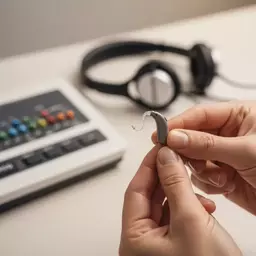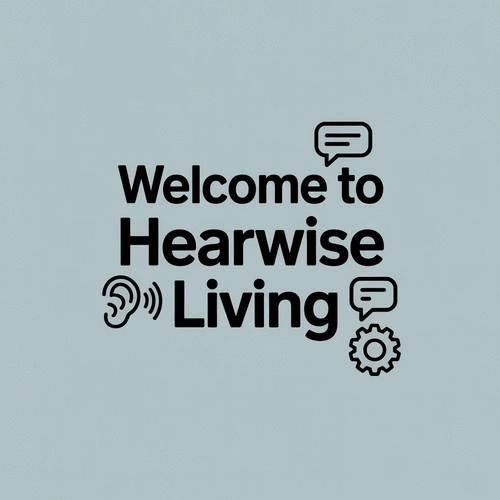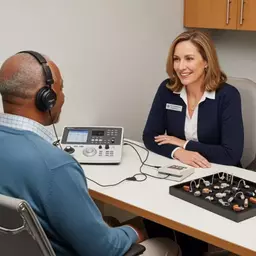Navigating hearing loss can lead to emotional challenges that many may not fully understand. As you journey through this complex landscape, consider how embracing acceptance and leveraging support networks can profoundly impact your well-being.
What You Will Learn
- Understanding the emotional impact of hearing loss can foster empathy and support among individuals and their loved ones.
- Acceptance of hearing loss is crucial in building resilience and enhancing communication with friends and family.
- Mindfulness practices, such as breath control and mindful listening, can improve coping skills for individuals facing hearing challenges.
- Journaling serves as a powerful tool for emotional expression, helping individuals track their feelings and identify effective coping strategies.
- Leveraging a support network, including open communication and patience from loved ones, is vital for emotional strength.
- Enhancing emotional intelligence can improve relationships and communication, essential for maintaining connections amidst hearing loss.
- Seeking professional help can empower individuals to navigate their emotional landscape and develop tailored coping strategies.
Emotional Challenges in Hearing Loss
Individuals with hearing loss often face unique emotional challenges. Below is a visual representation of key emotional responses and strategies for building resilience.
Emotional Challenges Faced
- • Feelings of Isolation
- • Increased Frustration
- • Loss of Confidence
Strategies for Resilience
- • Practicing Mindfulness
- • Journaling for Expression
- • Leveraging Support Networks
Key Self-Care Practices
- • Engaging in Physical Activities
- • Mindfulness & Journaling
- • Open Communication with Loved Ones
Benefits of Professional Guidance
- • Tailored Coping Strategies
- • Safe Space for Expression
- • Improved Overall Well-being
Understanding the Emotional Impact of Hearing Loss
Navigating the world with hearing loss can be incredibly challenging, and it often brings emotional and psychological hurdles that can feel isolating. Many individuals may experience feelings of frustration when they struggle to hear conversations or miss important cues in social settings. This can lead to a sense of loneliness, even when surrounded by loved ones. Recognizing these challenges is the first step towards understanding the emotional landscape that accompanies hearing impairment.
It’s essential to acknowledge that the emotional effects of hearing loss can vary widely from person to person. For some, it manifests as anxiety in social situations, while others might grapple with depression due to a perceived loss of independence and connection. Over time, these feelings can impact relationships, making it vital to address and discuss them openly with your support network.
Recognizing the Challenges of Hearing Loss
Individuals with hearing loss often face unique challenges that can lead to profound emotional responses. Here are some common emotional challenges to consider:
- Feelings of Isolation: Struggling to keep up in conversations can lead to withdrawing from social interactions.
- Increased Frustration: Constantly asking others to repeat themselves can be tiring and disheartening.
- Loss of Confidence: Hearing difficulties may lead to self-doubt, affecting one’s social presence and emotional well-being.
Understanding these challenges is crucial for individuals experiencing hearing loss and their loved ones. It fosters empathy and support that can help mitigate feelings of isolation and frustration.
The Importance of Acceptance in Building Resilience
Acceptance is a powerful tool in building emotional resilience. By acknowledging your hearing loss, you can begin to shift your focus from what you’ve lost to what you can still achieve. Embracing this reality can be liberating! It allows you to take proactive steps towards enhancing your quality of life, rather than feeling defeated by the challenges you face.
Acceptance also plays a crucial role in reducing stress levels. When you accept your hearing loss, you may find it easier to communicate your needs to friends and family. This openness can lead to better understanding and support, reinforcing your connections with the people around you—something we deeply value at HearWise Living.
Strategies for Building Emotional Resilience
Practicing Mindfulness to Enhance Coping Skills
Mindfulness practices can be incredibly beneficial for those experiencing hearing loss, helping to cultivate a sense of calm and presence amidst daily struggles. Engaging in simple mindfulness exercises can enhance your coping skills. Research highlights that mindfulness-based interventions can significantly improve mental health outcomes, including reducing anxiety and depression symptoms often associated with hearing challenges. Here are a few techniques to consider:
- Breathe Deeply: Focus on your breath for a few minutes each day to ground yourself.
- Body Scan: Take a moment to notice sensations in your body, identifying areas of tension and releasing them.
- Mindful Listening: Practice listening to your environment, focusing on different sounds around you without judgment.
These mindfulness practices can help you foster emotional resilience, enabling you to handle the ups and downs of your hearing health journey with greater ease and clarity.
Journaling as a Tool for Emotional Expression
Journaling offers a valuable outlet for emotional expression, allowing individuals to articulate their feelings and track their emotional progress. It can be a powerful way to process experiences and gain insights into your emotional responses, as discussed in studies on self-reflection and well-being. Here are some journaling prompts that can guide your reflections:
- What challenges did I face today regarding my hearing?
- How did I feel during social interactions?
- What coping strategies worked well for me?
By regularly engaging in this practice, you can better understand your emotions and identify patterns that may help in your journey towards emotional resilience.
Leveraging Support Networks for Emotional Strength
Family and friends play a vital role in fostering resilience for those living with hearing loss. Don’t be afraid to lean on your support network! Effective communication within these networks is crucial, as emphasized by research on improving communication and relationship satisfaction for individuals with hearing loss. Here’s how to leverage it effectively:
- Open Communication: Share your experiences and feelings with loved ones to deepen understanding.
- Seek Support Groups: Connecting with others who face similar challenges can provide comfort and solidarity.
- Encourage Patience: Ask your friends and family to be patient and supportive as you navigate conversations.
By building a strong support system, you can create an environment that encourages emotional growth and resilience, essential for living well with hearing loss.
Understanding the Role of Emotional Intelligence in Coping with Hearing Loss
Emotional intelligence (EI) is the ability to recognize and manage your own emotions while also understanding the emotions of others. Enhancing your EI can significantly improve your coping mechanisms when dealing with hearing loss. By developing empathy, you can better connect with those around you and facilitate more effective communication—important for maintaining relationships!
Emotional intelligence can also help in managing stress levels and preventing emotional exhaustion. As you become more aware of your feelings and those of others, you may find it easier to navigate the complexities of social interactions and maintain positive connections with your community.
Pro Tip
Did you know? Practicing active listening techniques can significantly improve your interactions with others. When in conversation, focus intently on the speaker's words and body language, and try to minimize distractions around you. This not only enhances your comprehension but also fosters a deeper connection with those you’re communicating with!
Encouraging Proactive Approaches to Emotional Resilience
Emotional resilience is key to navigating the complexities of hearing loss. Seeking professional help and counseling can be a vital step in this journey. If you find yourself feeling overwhelmed or isolated due to your hearing challenges, it’s okay to reach out for support. Professional guidance can provide you with tailored coping strategies and a safe space to express your feelings!
When considering professional support, it’s important to look for practitioners who specialize in hearing loss or related emotional health issues. This ensures that they understand the unique challenges you face. Here are some tips on how to approach seeking help:
- Identify your needs: Determine if you require counseling for emotional support, audiology consultations, or both.
- Research professionals: Look for therapists or audiologists experienced with hearing loss.
- Ask for recommendations: Reach out to your support network or hearing loss communities for referrals.
- Schedule a consultation: Meeting with a professional can help you gauge if they are a good fit for you.
Remember, seeking help is a sign of strength! Engaging with professionals can empower you to build emotional resilience and improve your overall well-being.
Personal Stories of Resilience in the Face of Hearing Loss
At HearWise Living, we believe in the power of community and shared experiences. Hearing personal stories can inspire hope and provide practical strategies for others facing similar challenges. For instance, I once spoke with a reader named Sarah, who learned to embrace her hearing loss through a combination of therapy and support groups. By connecting with others who shared her journey, she found strength in vulnerability and learned effective coping techniques.
Here are a few key takeaways from Sarah’s journey:
- Open communication: Sharing her experiences with friends and family helped them understand her needs better.
- Active participation: Joining a support group not only provided connection but also valuable resources and information.
- Positive mindset: Focusing on her abilities rather than limitations shifted her emotional landscape.
Stories like Sarah’s remind us that resilience is achievable! By drawing strength from our experiences, we can empower ourselves and others.
Building Healthy Relationships as a Support Mechanism
Healthy relationships are crucial in fostering emotional resilience when dealing with hearing loss. Surrounding yourself with supportive individuals can make navigating the complexities of hearing challenges less daunting. Family and friends can be your strongest allies in this process, providing emotional support and understanding.
Here are some tips for cultivating these important relationships:
- Educate your loved ones about your hearing loss to create understanding.
- Encourage them to communicate openly about their feelings and experiences concerning your hearing journey.
- Participate in activities together that accommodate your hearing needs, fostering connection and enjoyment.
Building these healthy relationships can lead to a stronger support network that enhances your emotional well-being. Remember, you don't have to face your hearing loss alone; together, you can thrive!
Summarizing Key Takeaways for Living Well with Hearing Loss
Emphasizing the Importance of Self-Care and Support
As we navigate the journey of hearing loss, self-care and building a strong support network are paramount. It’s essential to prioritize your mental health and emotional well-being. Acknowledge your feelings and validate your experiences while seeking help and camaraderie from those around you.
Key self-care practices include:
- Engaging in physical activities that you enjoy to boost both physical and mental health.
- Practicing mindfulness or journaling to express and process your emotions.
- Maintaining open lines of communication with loved ones about your needs and feelings.
By placing importance on self-care and relationships, you can foster a healthier emotional landscape.
Taking Action Towards Stress Management and Emotional Growth
It’s time to take action! Implementing the strategies discussed can significantly impact your emotional resilience and overall well-being. Start small; even integrating one new practice into your daily routine can create ripples of positive change.
Consider setting achievable goals, like dedicating a few minutes each day to mindfulness or connecting with a friend or support group weekly. Remember, each step you take is a movement towards emotional growth and better management of stress!
Exploring Educational Workshops and Community Resources for Continuous Learning
Continuous learning is vital for personal growth and resilience. Attending educational workshops and utilizing community resources can provide ongoing support as you navigate hearing loss. HearWise Living is dedicated to sharing valuable information and connecting you with resources that can enhance your knowledge and skills.
Here are some resources you can explore:
- Local audiology clinics often offer workshops on hearing health and technology.
- Online forums and webinars can provide valuable insights from experts and peer support.
- Community centers may host events focusing on wellness strategies for those with hearing loss.
By exploring these opportunities, you empower yourself to embrace your hearing journey with confidence and community!
Frequently Asked Questions About Coping with Hearing Loss
Recap of Key Points
Here is a quick recap of the important points discussed in the article:
- Emotional challenges of hearing loss include feelings of isolation, frustration, and loss of confidence.
- Acceptance of hearing loss is crucial for emotional resilience and helps improve communication with loved ones.
- Mindfulness practices, such as deep breathing and body scans, can enhance coping skills.
- Journaling can provide an effective outlet for emotional expression and self-reflection.
- Leveraging support networks through open communication can strengthen emotional health.
- Seeking professional support tailored to hearing loss challenges can empower individuals in their journey.
- Building healthy relationships through education and shared experiences fosters emotional resilience.







